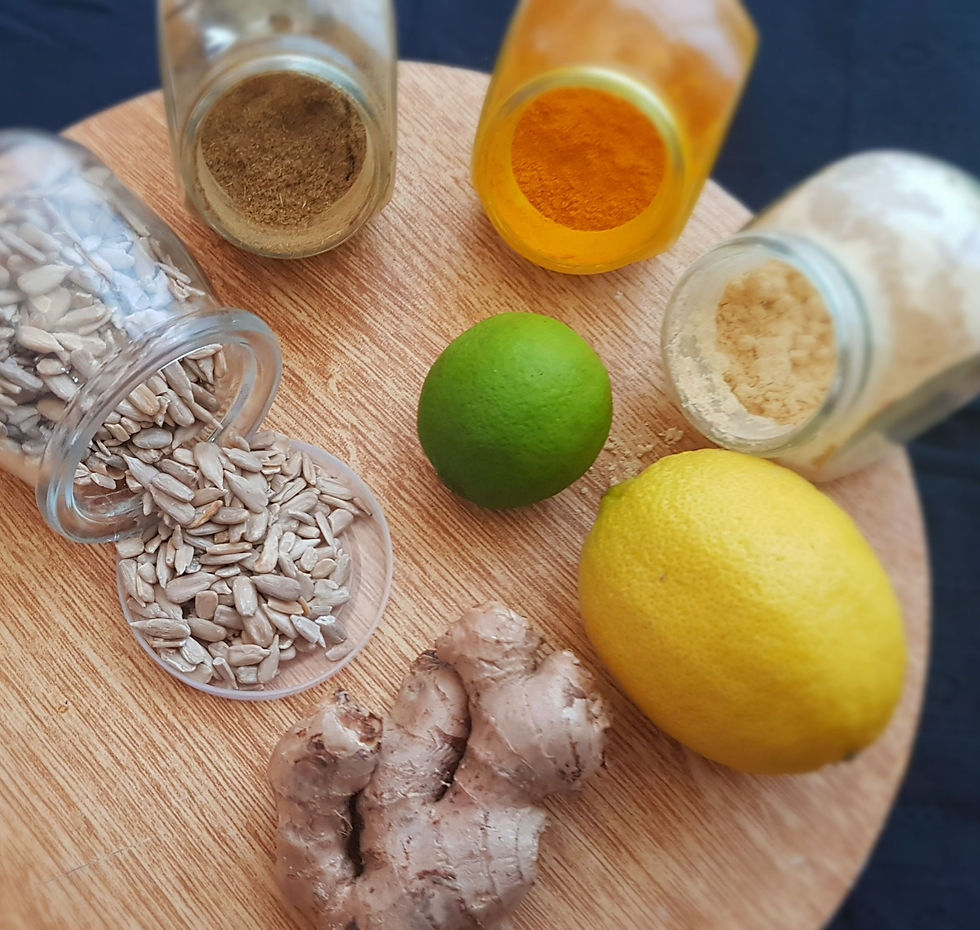12 Foods That Boost the Immune System
- Abir Nefida

- Mar 8, 2020
- 3 min read

The immune system is a host defense system comprising many biological structures and processes within an organism that protects against disease. Simply, It's the mechanism that protects your body from diseases and viruses.
Remember that prevention is better than cure. Don't wait until you get sick to look for alternative ways to boost your immunity. Instead, include these foods in your diet in a consistent manner and try to eat one of these foods once a day.
I. Fruits:
Citrus fruits: Because your body doesn't produce or store it, you need daily vitamin C for continued health. Almost all citrus fruits are high in vitamin C. With such a variety to choose from, it's easy to add a squeeze of this vitamin to any meal: Grapefruit, oranges, tangerines, lemons, limes and clementine.
Papaya is another fruit loaded with vitamin C. You can find 224 percent of the daily recommended amount of vitamin C in a single papaya. Papayas also have a digestive enzyme called papain that has anti-inflammatory effects. Papayas have decent amounts of potassium and B vitamins, which are beneficial to your overall health.
Kiwis are naturally full of a ton of essential nutrients, including folate, potassium, vitamin K, and vitamin C. Vitamin C boosts white blood cells to fight infection, while kiwi’s other nutrients keep the rest of your body functioning properly.
II. Vegetables:
Broccoli is supercharged with vitamins and minerals. Packed with vitamins A, C, and E, as well as many other antioxidants and fiber, broccoli is one of the healthiest vegetables you can put on your table. The key to keeping its power intact is to cook it as little as possible or better eat it raw..
Red bell peppers contain twice as much vitamin C as citrus. They’re also a rich source of beta carotene. Besides boosting your immune system, vitamin C may help maintain healthy skin. Beta carotene helps keep your eyes and skin healthy.
Spinach is rich in vitamin C. It's also packed with numerous antioxidants and beta carotene, which may increase the infection-fighting ability of our immune systems. Similar to broccoli, spinach is healthiest when it’s cooked as little as possible so that it retains its nutrients.
Ginger contains high levels of Vitamin C, magnesium and other minerals. Which may help decrease inflammation and can help reduce a sore throat and other inflammatory illnesses.
Garlic is more famous as a flavor boost to many dishes in several cuisines in the world. Actually this veggie has more health benefits than its flavor. Garlic’s immune-boosting properties seem to come from a heavy concentration of sulfur-containing compounds, such as allicin. Garlic may also help lower blood pressure and slow down the hardening of the arteries.
Turmeric is like ginger and garlic these veggies are more known as spices. Generally speaking, it's better to consume them fresh to benefit from their vitamins and mineral...Turmeric is also known as an anti-inflammatory in treating both osteoarthritis and rheumatoid arthritis.
Almond is rich in vitamin E which is key to a healthy immune system. It’s a fat-soluble vitamin, meaning it requires the presence of fat to be absorbed properly. Nuts, such as almonds, are packed with the vitamin and also have healthy fats. A half-cup serving, which is about 46 whole, shelled almonds, provides nearly 100 percent of the recommended daily amount of vitamin E.
Green tea: Both green and black teas are packed with flavonoids, a type of antioxidant. Where green tea really excels is in its levels of epigallocatechin gallate(EGCG), another powerful antioxidant. EGCG has been shown to enhance immune function. Green tea, on the other hand, is steamed and not fermented, so the EGCG is preserved. Green tea is also a good source of the amino acid L-theanine. L-theanine may aid in the production of germ-fighting compounds in your T-cells.
Cumin seeds have antiseptic and anti-inflammatory properties. Research published in the International Journal of Molecular Sciences found that cumin and other spices possess significant antibacterial and antifungal activities. That’s why cumin seeds can be used to prevent food spoilage caused by pathogens and harmful fungi. Cumin seeds can also increase your vitamin C intake. The presence of vitamin C in cumin seeds allows the spice to serve as an immune system booster.
Sunflower seeds are full of nutrients, including phosphorous, magnesium, and vitamin B-6. They’re also incredibly high in vitamin E, a powerful antioxidant. Vitamin E is important in regulating and maintaining immune system function.




Comments